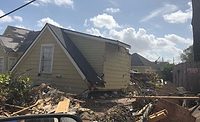Florida Insurance Roof Endorsements Aim to Curtail Non-Storm Claims

Two insurance companies have put forth roof endorsements that bar claims for numerous issues, with the exception of named storms, potentially limiting how roofing contractors can carry out their work.
As first reported in the Insurance Journal, Slide Insurance submitted a “me-too” filing similar to one approved for Florida Peninsula Insurance Company, similar to an endorsement from American Integrity Insurance filed in 2019. The Slide filing received approval from Florida’s Office of Insurance Regulation.
The limitation on roof coverage expands the definition of “roof surfacing” to include standard fares such as shingles, panels or tiles, but also includes cladding, underlayment or decking; felt and membranes; metal or synthetic sheeting; roof vents; roof flashings and drip edges; turbines; and skylights.
The effective date for the changes is Aug. 1 for new business and renewals.
As a result, the Slide endorsement will not cover loss to “roof surfacing” directly or indirectly related to a number of issues, which are:
- Wear and tear, marring, spatter marks, or deterioration
- Displacement or removal of roof surface granules that does not result in fracturing, bruising, puncturing, or other damage to the base material or underlying mat
- Inherent vice or latent defect
- Faulty, inadequate, or defective maintenance
- Faulty, inadequate, or defective materials used in repair, construction, renovation, or remodeling
- Faulty, inadequate, or defective design, specifications, workmanship, repair, construction, renovation, or remodeling
- Settling, shrinking, bulging, or expansion, including resultant cracking
The only instances where these issues are covered are if it’s a hurricane or a "named" storm. This means the endorsement could essentially stop most roof claims, including damage caused by a tornado or hail storms.
This means the number of claims may significantly shrink, though attorneys and adjusters are already raising questions about the endorsement, expressing concerns about its ability to give insurers more leeway in denying claims.
Trent Cotney, a partner at Adams and Reese, said that for roofers, the Slide filing is “extremely broad” and would be hard to show that it would fall under the endorsed exclusions.
“I don’t think it is as black and white as insinuated and also subject to legal challenge,” said Cotney in an email.
Michael Packer, a Fort Lauderdale insurance defense attorney with Marshall Dennehey, told the Insurance Journal he expects it will “hopefully continue to reduce litigation.”
“I think the endorsement adds clarity for both sides when it comes to non-named storm events as to what will and will not be covered,” he told Insurance Journal.
RELATED: Learn more about how Florida and other states legislate roofing and insurance policies here.
The endorsements arrived shortly after Florida signed into law numerous changes to property insurance claims and how roofing contractors can do business in the Sunshine State. Most notably, the laws changed how the assignment of benefits works, and how roofing companies can advertise. Challenges to Slide’s endorsement may be few and far between after Florida passed laws that affect how lawsuits are litigated.
Florida isn’t done with its insurance reform, either. At the end of May, Gov. Rick DeSantis signed three bills into law related to the property insurance market. SB 7052 further increases competition and accountability, such as clarifying that once a roof deductible is applied, no other deductible under the policy may be applied to any loss caused by the same peril. HB 799 makes it so residential property insurers provide a discount, credit or reduction in deductibles for wind uplift prevention measures.
DeSantis also signed HB 881, which expands eligibility for the May Safe Florida Home Program. First included in SB 2D signed last year, the new law ensures more Floridians can participate. Upgrades funded through the program can result in premium discounts for participants.
Lawmakers hope all these efforts will stabilize a problematic insurance market overrun with rising insurance costs and canceled policies.
Looking for a reprint of this article?
From high-res PDFs to custom plaques, order your copy today!






